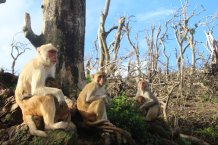Articles

Females and their infants sitting close to one another in a bare landscape on Cayo Santiago (credit Prof Lauren Brent)
Monkeys made more friends after hurricane
Monkeys formed more friendships and became more tolerant of each other after their island was devastated by a hurricane, new research shows.
Hurricane Maria killed more than 3,000 people in Puerto Rico in 2017, and also caused severe damage on Cayo Santiago – known as "Monkey Island" as it is home to a population of rhesus macaques.
Scientists compared social networks of two groups of macaques before and after the hurricane, and found an increase in friendly social connections, despite fewer resources.
The research team – led by the universities of Pennsylvania and Exeter – also found that macaques worked on building new relationships rather than strengthening existing ones.
"They extended their social networks to include more partners," said lead author Camille Testard, of the University of Pennsylvania.
"This tells us that these animals can dynamically respond to major events by tweaking the composition of their social networks – individuals who are socially isolated aren’t locked into that, and new relationships can be formed.”
The researchers analysed social networks by observing proximity (macaques sitting close to each other) and grooming.
The increase in social connections was driven largely by the macaques that were most socially isolated before the hurricane.
They also opted for the paths of least resistance, forming connections with the friends of their friends.
"We expected the monkeys would use their closest allies to cope with the ecological devastation of the hurricane and so would invest in their existing relationships," said Professor Lauren Brent, of the University of Exeter.
“So we were surprised that, after the hurricane, they expanded their social networks and the number of individuals they tolerated.
"These were not always active interactions – tolerance might mean simply sharing a shady place to sit.
"Our closest friends can give us many things. But sometimes what we need is a social network where everyone is just friendly enough.”
The hurricane damage on Cayo Santiago was severe, with two thirds of green vegetation gone, along with all of the research infrastructure.
"Through some heroic efforts from the team down there, and generous donations via crowdfunding, we were able to get research back up and running pretty quickly," said Professor Michael Platt, of the University of Pennsylvania.
"That put us in a unique position to study how the monkeys’ behaviour may have changed in response to a natural disaster, the sort that’s becoming more common and intense as a result of climate change."
Three years on, the island’s vegetation hasn’t yet recovered and the macaques on Cayo Santiago seem to have maintained the connections formed after the hurricane – they remain more tolerant of each other.
The study's findings support the hypothesis that social support could help primates adapt to extreme environmental change.
The research team also included researchers from the University of Washington, University of Roehampton, University of Puerto Rico, New York University and Arizona State University.
Funding for the study came from the National Institutes of Health, the National Science Foundation and the Royal Society.
The paper, published in the journal Current Biology, is entitled: "Rhesus macaques build new social connections after a natural disaster."
Date: 8 April 2021
